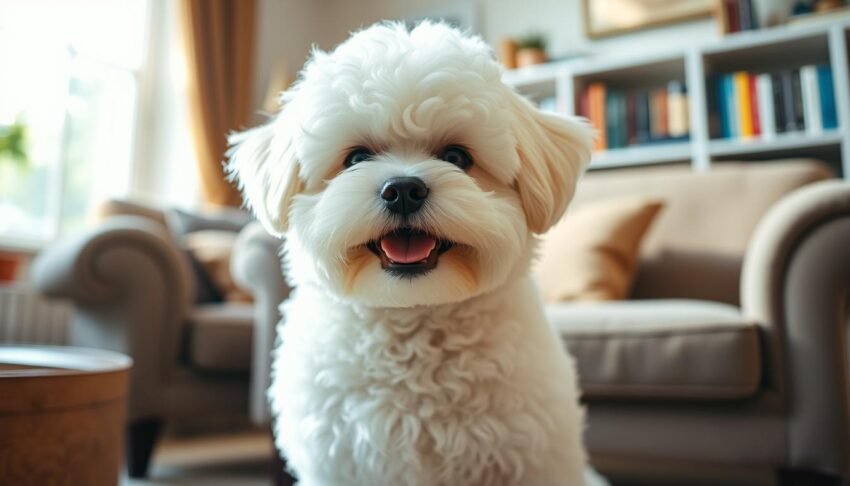The Bichon Frise breed is a small dog with a rich history, originating from the Mediterranean region, and is known for its friendly and playful nature, making it an excellent companion for families and singles, with a typical lifespan of a Bichon Frise is between 14 to 15 years, with many living even longer with proper care1. The Bichon Frise is considered hypoallergenic, meaning they are less likely to cause allergic reactions in sensitive individuals1, and they generally weigh between 12-18 pounds1. Adult Bichon Frise dogs stand about 9.5 to 11.5 inches tall at the shoulder2, and the breed was recognized by the American Kennel Club (AKC) in 19722.
The Bichon Frise is a beloved breed that has been charming dog lovers for centuries, with its small size, gentle disposition, and low-shedding coat making it an ideal breed for those who want a low-maintenance yet loving companion, and the expected lifetime cost of owning a Bichon Frise ranges from $21,000 to $51,0001. The Bichon Frise dogs are utilized in therapy work due to their gentle and empathetic nature2, and they are prone to heart issues, necessitating regular vet check-ups3.
Key Takeaways
- The Bichon Frise is a small dog with a rich history and a friendly and playful nature, making it an excellent companion for families and singles.
- The Bichon Frise is considered hypoallergenic and has a typical lifespan of 14 to 15 years1.
- The breed was recognized by the American Kennel Club (AKC) in 19722.
- The expected lifetime cost of owning a Bichon Frise ranges from $21,000 to $51,0001.
- The Bichon Frise is prone to heart issues, necessitating regular vet check-ups3.
- The Bichon Frise dogs are utilized in therapy work due to their gentle and empathetic nature2.
- The Bichon Frise is a beloved breed that has been charming dog lovers for centuries, with its small size, gentle disposition, and low-shedding coat making it an ideal breed for those who want a low-maintenance yet loving companion.
Overview of the Bichon Frise Breed
The Bichon Frise dog has a long and storied history, dating back to the 14th century4. Originally bred as a companion dog, the Bichon Frise was a favorite among European royalty, including the French and Italian aristocracy. Its small size, gentle disposition, and low-shedding coat made it an ideal breed for palace life. Today, the Bichon Frise is still beloved for its charming personality and adorable appearance.
When it comes to Bichon Frise puppies, it’s essential to consider their grooming needs. Bichon Frise grooming is a crucial aspect of their care, as their coats require regular brushing and trimming to prevent matting and tangling5. Daily brushing and routine scissoring are necessary to maintain the Bichon’s coat, highlighting the grooming needs of the breed5.
History of the Bichon Frise
The Bichon Frise has a rich history, with its origins dating back to the Mediterranean region4. The breed was introduced to the Canary Islands by Spanish sailors and later became a popular companion dog among European royalty. The Bichon Frise was recognized in France as “Bichon a Poil Frisé” in March 19335.
Key Characteristics of the Bichon Frise
Some key characteristics of the Bichon Frise include its small size, with a height at withers of 9.5 to 11.5 inches (24 to 30 cm)4, and a weight range of 12 to 18 pounds (5 to 8 kg)4. The breed is known for its gentle disposition, low-shedding coat, and adaptability, making it an ideal choice for city living5. Bichon Frises are considered hypoallergenic, which is a significant selling point for pet owners5.
- Life expectancy: 14 to 15 years4
- Recognition by the American Kennel Club: 19724
- Year Bichons were first brought to the United States: 19564
- Recommended frequency of brushing: At least every other day, with daily brushing recommended4
Overall, the Bichon Frise is a charming and adaptable breed that makes an excellent companion dog. With its gentle disposition, low-shedding coat, and small size, it’s no wonder why the Bichon Frise has remained a popular breed for centuries6.
Understanding the Bichon Frise Temperament

The Bichon Frise is known for its friendly and playful nature, making it an excellent companion for families and singles. With a gentle disposition and low-shedding coat, this breed is ideal for those who want a low-maintenance yet loving companion7. To understand the Bichon Frise temperament, it’s essential to consider their suitability for families and singles, as well as their training needs.
When it comes to Bichon Frise care, it’s crucial to provide regular exercise and mental stimulation to prevent separation anxiety, which can affect up to 70% of Bichon Frises if left alone for extended periods7. With a lifespan of 10-15 years, Bichon Frises require ongoing Bichon Frise care, including regular grooming and health check-ups to prevent common health issues such as allergies and dental problems8.
Friendly and Playful Nature
Bichon Frises are renowned for their affectionate and playful personalities, making them an excellent choice for families with children. Studies have shown that Bichon Frises have a positive interaction rate of over 85% with young kids in comparable family settings7. With their high affection level and kid-friendly nature, Bichon Frises are an ideal breed for families seeking a loving and gentle companion.
Suitability for Families and Singles
Whether you’re a family or a single person, the Bichon Frise is an excellent choice due to its adaptability to different living situations. Approximately 50% of Bichon Frises are reported to have some level of adaptability to apartment living due to their size and energy requirements7. With proper Bichon Frise care and attention, this breed can thrive in various environments, making them an ideal companion for many individuals.
Grooming Needs of the Bichon Frise
As a Bichon Frise owner, you’ll need to prioritize regular Bichon Frise grooming to prevent matting and tangling of its coat9. This breed requires professional grooming approximately every 4 weeks, as well as weekly maintenance grooming at home9. Puppies up to 4 months should be brushed every few days to prevent matting and tangling9.
When it comes to Bichon Frise care, it’s essential to use the right tools. A good quality brush, scissors, and clippers are must-haves for any Bichon Frise owner. You can also consider investing in a deshedding tool to reduce shedding, which is estimated to be around 1-2% compared to other breeds10.
Here are some tips for grooming your Bichon Frise:
- Brush your Bichon Frise’s coat regularly to prevent matting and tangling9
- Use a good quality shampoo and conditioner to keep your Bichon Frise’s coat clean and healthy10
- Consider investing in a deshedding tool to reduce shedding10
Remember, regular Bichon Frise grooming is crucial to prevent matting and tangling, as well as to keep your Bichon Frise’s coat clean and healthy9. By following these tips and using the right tools, you can keep your Bichon Frise looking and feeling its best10.
Health Considerations for Bichon Frise Owners

As a Bichon Frise owner, it’s essential to be aware of the potential health issues that can affect your pet. Regular Bichon Frise care can help prevent or manage these conditions. The average lifespan of a Bichon Frise is approximately 14–15 years11, and with proper care, you can help your pet live a long and healthy life.
Some common health issues that can affect Bichon Frises include hip dysplasia, allergies, and dental disease. Dental disease affects 80% of all dogs by age two, with Bichon Frises being more likely to experience dental issues than other breeds12. Regular dental check-ups and cleanings can help prevent this condition.
To keep your Bichon Frise healthy, consider the following tips:
- Feed a balanced diet to maintain a healthy weight
- Provide regular exercise and mental stimulation
- Schedule regular veterinary check-ups and dental cleanings
By following these tips and being aware of potential health issues, you can help your Bichon Frise live a long and healthy life. Remember, regular Bichon Frise health check-ups and preventive care are essential to maintaining your pet’s overall health and well-being11.
Training Your Bichon Frise Effectively
When it comes to Bichon Frise training, consistency and positive reinforcement are key. As an intelligent breed, Bichon Frises respond well to commands and socialization, making them a joy to train13. To develop a well-rounded dog, it’s essential to start socialization training between 6 to 14 weeks of age, minimizing fear-based aggression or anxiety13.
A crucial aspect of Bichon Frise training is housebreaking, which can take time and patience. Basic obedience commands, such as “sit,” “stay,” and “come,” are essential, and positive reinforcement with treats and short training sessions is most effective13. Additionally, using a clicker as a training aid can significantly improve response to commands13.
For effective Bichon Frise training, it’s recommended to keep training sessions short, lasting 10-15 minutes, and conducted 2-3 times a day14. Consistency in commands is also vital, and varying commands can create confusion, so sticking to one-word commands is recommended14. With patience, consistency, and positive reinforcement, you can bring out the best in your Bichon Frise’s temperament and train them effectively15.
By following these tips and being mindful of your Bichon Frise’s unique needs and personality, you can develop a strong bond with your dog and help them become a well-behaved and loving companion.
Nutrition and Diet for Bichon Frise
As a Bichon Frise owner, providing the right nutrition and diet is crucial for your dog’s overall health and well-being. A balanced diet that includes high-quality protein and complex carbohydrates is essential for maintaining your Bichon Frise’s energy levels and preventing health issues16. When it comes to Bichon Frise nutrition, it’s essential to choose a dog food that meets their specific needs, taking into account their age, size, and activity level.
For Bichon Frise puppies, a diet that comprises 22% protein is recommended17. As they grow, their dietary needs change, and adult Bichon Frise dogs require dog food that contains a minimum of 18% protein17. A well-balanced Bichon Frise diet should also include complex carbohydrates, such as whole grains, fruits, and vegetables, to provide fiber, vitamins, and minerals.
Here are some tips for creating a healthy Bichon Frise diet:
- Choose a high-quality dog food that meets your Bichon Frise’s nutritional needs
- Feed your Bichon Frise according to their age, size, and activity level
- Include complex carbohydrates, such as whole grains, fruits, and vegetables, in their diet
- Avoid overfeeding, as this can lead to obesity and other health issues17
By providing a well-balanced Bichon Frise diet and following these tips, you can help ensure your dog leads a happy and healthy life. Remember to always consult with your veterinarian before making any changes to your Bichon Frise’s diet or nutrition plan16.
Activities and Exercise for Bichon Frise
As a Bichon Frise owner, it’s essential to provide your dog with regular Bichon Frise exercise to keep them happy and healthy18. A daily routine of approximately 30 minutes of physical activity is recommended18. This can include short walks, playtime in the park, or even indoor games. For puppies, it’s suggested to start with 5 minutes of exercise per day for every month of their age18.
In addition to physical activity, Bichon Frise activities can help stimulate their mind and prevent boredom. Enrichment games and interactive toys can be a great way to engage your Bichon Frise and provide mental stimulation18. Some examples of activities include:
- Hide-and-seek games
- Obstacle courses
- Scent work
It’s also important to monitor your Bichon Frise’s daily activity levels, which can be done using a GPS tracker like PitPat18. This can help you ensure your dog is getting enough physical and mental stimulation. By providing a balanced routine of Bichon Frise exercise and Bichon Frise activities, you can help keep your dog happy, healthy, and well-adjusted19.
Traveling with Your Bichon Frise
As you prepare for Bichon Frise travel, it’s essential to consider Bichon Frise safety to ensure a comfortable and enjoyable trip for both you and your pet. With approximately 30% of dog owners traveling with their pets, it’s crucial to plan ahead and research pet-friendly accommodations20. When traveling with your Bichon Frise, you’ll want to find hotels or vacation rentals that allow pets and have suitable amenities for your furry friend.
To prepare your Bichon for new environments, start by getting them accustomed to their carrier or crate. This will help reduce anxiety and make travel more enjoyable for both you and your pet20. You can also take steps to ensure your Bichon’s safety during travel, such as using reflective gear for night walks and avoiding leaving them in parked cars20.
Here are some tips for safe Bichon Frise travel:
- Research pet-friendly destinations and accommodations
- Get your Bichon accustomed to their carrier or crate
- Use reflective gear for night walks
- Avoid leaving your Bichon in parked cars
- Bring a pet health kit and essential supplies, such as portable bowls and a first-aid kit20
By following these tips and taking the necessary precautions, you can ensure a safe and enjoyable trip with your Bichon Frise. Remember to always prioritize your pet’s comfort and safety, and don’t hesitate to reach out to a veterinarian if you have any concerns21.
Finding a Bichon Frise: Adoption and Purchase
When considering bringing a Bichon Frise into your family, you have two primary options: Bichon Frise adoption or Bichon Frise purchase. Both paths can lead to a loving and rewarding relationship with your new companion. If you decide to adopt, you can find Bichon Frises through rescue organizations that specialize in this breed22. These organizations often have a wide range of ages and personalities available for adoption, from young puppies to older, more gentle souls.
On the other hand, if you prefer to purchase a Bichon Frise, it’s essential to find a responsible breeder who prioritizes the health, well-being, and temperament of their dogs23. A reputable breeder will be transparent about the dog’s lineage, health clearances, and socialization. They will also provide guidance on care, feeding, and training to ensure a smooth transition for both you and your new pet.
Some key factors to consider when deciding between Bichon Frise adoption and purchase include your lifestyle, the amount of time you have to dedicate to your pet, and your budget. Both adopted and purchased Bichon Frises can make wonderful companions, provided they receive the love, care, and attention they deserve. By choosing either the adoption or purchase route, you can bring joy and companionship into your life with a Bichon Frise22.
Ultimately, whether you choose Bichon Frise adoption or purchase, the most important thing is to provide a forever home where your new companion will be loved, cherished, and well-cared for. With patience, understanding, and the right guidance, you and your Bichon Frise can share a happy, healthy life together23.
Why the Bichon Frise is a Popular Choice
The Bichon Frise has earned a reputation as a beloved companion pet due to its charming personality and adorable appearance.
This hypoallergenic breed is recognized by the American Kennel Club and is known for its minimal shedding, making it a suitable option for individuals with allergies24. Moreover, the Bichon Frise’s low-maintenance grooming requirements, including weekly bathing and coat trimming, contribute to its popularity among dog owners24.
Beyond its physical attributes, the Bichon Frise is also praised for its friendly and playful nature. Despite being energetic, this breed requires moderate exercise, making it well-suited for a variety of living situations, from apartments to larger homes24. Additionally, Bichons are highly trainable due to their eagerness to please their owners, further enhancing their appeal as a family-friendly companion24.
The Bichon Frise community is vibrant, with numerous breed clubs, rescue organizations, and online forums dedicated to celebrating and supporting this charming breed25. Whether you’re looking to adopt or purchase a Bichon Frise, there are plenty of resources available to help you find the perfect furry friend and provide ongoing support throughout their lifetime, which can span up to 17 years25.
FAQ
What is the history of the Bichon Frise breed?
What are the key characteristics of the Bichon Frise?
How do I groom a Bichon Frise?
What are some common health issues associated with the Bichon Frise?
How do I effectively train a Bichon Frise?
What is the best diet for a Bichon Frise?
How much exercise does a Bichon Frise need?
What should I consider when traveling with a Bichon Frise?
Where can I adopt or purchase a Bichon Frise?
What are the benefits of owning a Bichon Frise?
Source Links
- Bichon Frise: The Good, the Bad, and the Ugly – https://figopetinsurance.com/blog/bichon-frise-breed-guide
- The Bichon Frise: The Cheerful and Charismatic Companion – https://www.zealandiapets.com/pages/the-bichon-frise-the-cheerful-and-charismatic-companion?srsltid=AfmBOorVV8vn40ev4xEX470ewxtom0IT1qqqCty1NddZtU6SWxJg6ql0
- Bichon Frise – https://www.thedrakecenter.com/services/dogs/breeds/bichon-frise
- Bichon Frise | Description, Behavior, & Facts | Britannica – https://www.britannica.com/animal/bichon-frise
- No title found – https://www.akc.org/expert-advice/dog-breeds/bichon-frise-history/
- What to Know About Bichon Frises – https://www.webmd.com/pets/dogs/what-to-know-about-bichon-frises
- Bichon Frise Dog Breed Information & Characteristics – https://dogtime.com/dog-breeds/bichon-frise
- Learn About the Friendly and Fluffy Bichon Frise – https://www.thesprucepets.com/bichon-frise-dog-breed-profile-1117940
- Grooming Tips | Bichon Frise Club of America – https://bichon.org/about-bichons/breed-info/grooming-tips/
- Bichon Frise: Temperament, Lifespan, Grooming, Training – https://www.petplan.co.uk/pet-information/dog/breed/bichon-frise/
- Bichon Frise – https://www.petmd.com/dog/breeds/bichon-frise
- Breed Info – My Family Vet – https://myfamilyvet.com/client-resources/breed-info/bichon-frise/
- How to Train a Bichon Frise: 7 Simple Tips (With Pictures) – Dogster – https://www.dogster.com/dog-training/how-to-train-a-bichon-frise
- 12 Secrets for Teaching a Bichon Frise Puppy Obedience – https://iheartdogs.com/12-secrets-for-teaching-a-bichon-frise-puppy-obedience/
- Bichon Frise 101: Owner’s Guide – https://gratefulpaw.com/bichon-frise-training
- Bichon Frise Feeding Guide – https://www.prodograw.com/raw-feeding-guide/bichon-frise-feeding-guide/
- Best Dog Food for Bichon Frise: A Comprehensive Nutritional Guide – https://americannaturalpremium.com/breed-guide/best-dog-food-for-bichon-frise-a-comprehensive-nutritional-guide/
- How much exercise does a Bichon Frise need? – https://www.pitpat.com/exercise/how-much-exercise-does-a-bichon-frise-need/?srsltid=AfmBOopORZ2SwDcKED2Zhow0rGJKtJgi3MvJ6-3217j4qmxIPpLITMJd
- How Much Exercise Does a Bichon Frise Need? Vet-Reviewed Advice – Dogster – https://www.dogster.com/dog-health-care/how-much-exercise-does-a-bichon-frise-need
- Traveling with a Bichon Frise: Tips for Success – https://iheartdogs.com/traveling-with-a-bichon-frise-tips-for-success/
- Bichon Frise – https://www.orvis.com/bichon-frise.html?srsltid=AfmBOorIR_0NmrM1YJ0gtoIkqBQWgBQ4Na4MhBwZYzWnBHhe2t3f9j2a
- ADOPTION – https://bichonfurkids.org/adoption/
- Bichon Frise Dog Breed & Adoption Info – https://www.petfinder.com/dogs-and-puppies/breeds/bichon-frise/
- No title found – https://www.akc.org/expert-advice/lifestyle/fun-facts-bichon-frise/
- Bichon Frise are Best! – Dogs for Sale in UK – https://mypetbond.com/petscorner/general-news/bichon-frise-are-best/


